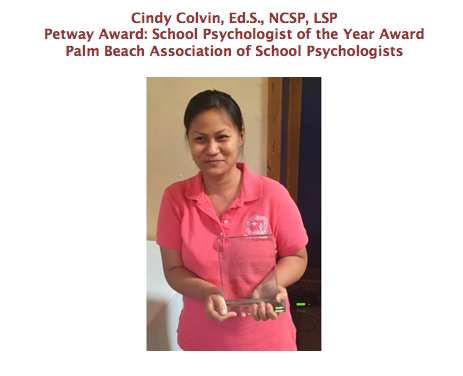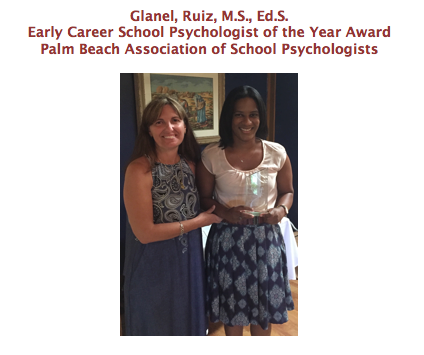The School District of Palm Beach County, Florida - Other School Department Based Activities
Celebrating 10 Years Of Wellness

School Psychological Services
The delivery of school psychological services was provided under the umbrella of a wide system of specialized programs offered by the Department of Exceptional Student Education. Throughout this school year the practice and objectives of School Psychological Services aligned with the goals delineated by the School District of Palm Beach County’s (SDPBC) Strategic Plan.
During the 2015-2016 school year ninety-eight school psychologists were assigned to Palm Beach County District Schools. They provided direct and indirect services to our student population from preschool to young adulthood. A sample of services offered included psycho-educational evaluations, parent and teacher consultation, crisis assistance/intervention, student data analysis and progress monitoring, implementation of evidenced-based interventions, behavioral management, student counseling, parent/teacher training, professional development, and student skills-training groups. School psychologists also interfaced with other District departments and community stakeholders to ensure positive student outcomes.
The theme of the National Association of School Psychologists (NASP) drive this school year was “School Psychologists Connect the Dots”. This theme captures well the path taken by our District team of school psychologists: Advancing exemplary practice by “connecting the dots”. Our school psychologists were problem solvers who considered multiple factors during their interactions with students, parents, and teachers. This integrative, collaborative, and holistic approach examined multiple variables when faced with problem-solving challenges. For instance, they connected the dots by considering interactive variables that impact solutions such as student characteristics, developmental and environmental factors, parent/teacher variables, social functioning, and cultural differences. Explicit and well-defined problems led to effective research-based plans of action that contributed to positive results.
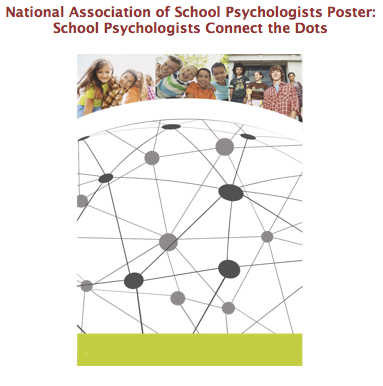
As problem-solvers, school psychologists advocated this year for psychometrically robust progress monitoring tools to assess with validity students’ progression. Consequently, their involvement in the Multiple Tiered of System of Support (MTSS) process and Response to Intervention was essential. The Best Practices School Psychology Committee (BPSPC) further advanced the District’s MTSS methods through collaborative efforts with the MTSS/Safe Schools staff to finalize a teacher/parent manual, expand the pool of interventions, and consolidate effective best practices. Additionally, the BPSPC improved clinical practices and took measures to address problems with disproportionality in special education.
Dots were also connected through a focus on developing relationships and emphasizing collaboration within and between systems. School psychologists promoted an optimum learning milieu and a positive school culture for all students with educators and administrators. At risk students were identified through careful joint analysis of educational data. School psychologists also led mental health projects with community providers; supported local special needs programs; and established connections with several communities that support our students and families. The genuine intent to collaborate with District departments (e.g., Multicultural Education Department, Student Services, Safe Schools, School Board initiatives), families, schools, and community stakeholders facilitated the promotion of students’ positive outcomes…all examples of connecting the dots at its finest!
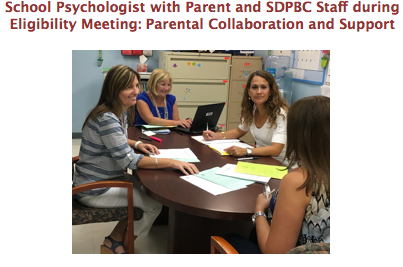
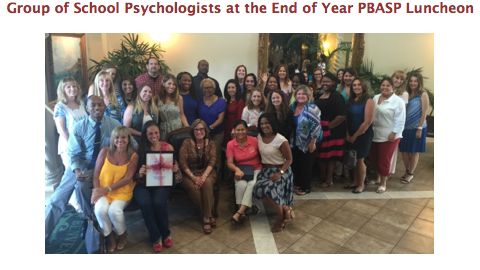
The Multicultural School Psychology Team
The fourteen members of the Multicultural School Psychology Team (MCSPT) provided psychological services in Spanish, Creole, Portuguese, and French. They worked closely with parents, students from pre-school to young adulthood, and teachers across our large English Language Learners (ELL) population. The MCSPT offered parallel services to those conducted by our monolingual school psychologists. In addition, they actively advocated for fair and equitable practices with educators and administrators through consultation and program development. For instance, changes were made within existing procedures to improve assessment practices of the culturally and linguistically diverse. Given their expertise in culturally responsive practices, the MCSPT was a vital contributor to school-based teams/ MTSS services and supported the effectiveness of school-based colleagues. In this capacity, they were able to incorporate psycho-cultural factors that impacted learning and socio-emotional development. For instance, they fused their expertise in problem-solving as they addressed language development, second language acquisition, adjustment to a new culture, and social- justice practices. This latter focus expanded educator understanding of the needs, strengths, and barriers of the culturally and linguistically diverse. The MCSPT also enhanced the delivery of services during crisis incidents, as well as were effective addressing parental concerns in the family’s native language.
The Child Find / Pre-Kindergarten Team
The Child Find Pre-Kindergarten Team plays an important role in the early identification of children’s developmental delays and disabilities. Because they are often the first providers who communicate difficult news to parents, Pre K school psychologists must have exceptional communication skills to support and empower parents with exceptional children. The nine school psychologists specialized in preschool services worked in six locations. They provided developmental screenings, psycho-educational evaluations, educational planning, student advocacy, community collaboration, parent training, special education eligibility meetings, and program consultation.
Risk Management and Crisis Intervention
Specialized school psychology teams were allocated to schools as soon as crises developed. The range of services was tailored to the situation in question. Approximately twenty-two crisis events occurred during the school year that required the intervention of school psychologists. Some of the issues addressed included coping with sudden death of students or teachers, witnessing violent crimes, and addressing fatal accidents. Crisis intervention focused on students as well as teachers, administrative staff, families, and the community. On these occasions, school psychologists provided long hours of crisis work until those helped reached an initial level of stability and those at risk of potential decompensation were identified. Follow up care was provided for individuals affected until other community supports were established. The team also engaged in post event analytic debriefings regarding the management of the crisis, the effectiveness of the interventions, and the identification of needed improvements in case of future events.
In order to enhance our ability as mental health providers in the prevention, assessment, and intervention of crisis events in schools, the School Psychological Services initiated a plan for District wide PREPaRE training. The training is available for all school psychologists and other District providers. PREPaRE is a comprehensive and evidenced-based program designed by the National Association of School Psychologists (NASP) to specifically address risk management/crisis intervention in schools. PREPaRE training will be a joint project between the School Psychological Services and the Palm Beach Association of School Psychologists (PBASP). Collaboration with other District departments is also planned. A few school psychologists on staff have received nationally sponsored PREPaRE training. Others will be pursing additional “train the trainer” credentials to be able to teach advanced crisis management and mental health skills to all interested District professionals. The ultimate goal is to train all school psychologists in the PREPaRE program.
The Internship Program
During the 2015-2016 school year six school psychology internships were sponsored. Interns were graduate students from Barry University, Florida International University, Northern Arizona University, and the University of Central Florida. The internship provided a rich array of learning experiences through several rotations that allowed opportunities to work with different student populations. The Internship placement provided approximately fifteen hundred hours of experience and interns received both individual and group supervision. As an internship project, they conducted a professional training for all school psychologists on advanced MTSS methods, as well as developed a series of report templates for new psychological tests.
Recently, School Psychological Services began a collaborative venture with NOVA Southeastern University – School Psychology Doctoral Program. The objective is to establish an accredited internship placement through the American Psychological Postdoctoral and Internship Centers (APPIC, American Psychological Association). This internship will meet criteria for doctoral level interns as well as attract highly credentialed new professionals to the District.
Special Events
This past school year, School Psychological Services, along with the SDPBC Division of Teaching and Learning/School Counseling and SDPBC Safe Schools Department, as well as the Boy’s Town of South Florida agency, organized the 3rd Annual Student Mental Health and Wellness Conference (SMHaWC 3.0) at Park Vista High School in Boynton Beach, FL. Five school psychologists conducted presentations in this successful and well-attended conference.
Many community agencies and institutions supported the SDPBC Wellness Conference. The following list includes agencies and associations that sponsored the conference:
- Boca Raton’s Promise/Palm Beach County Action Alliance for Mental Health
- The Ryan Licht Sang Bipolar Foundation
- Boy’s Town South Florida
- Youth Services Department
- Chrysalis Health
- Palm Beach Association of School Psychologists
- Palm Beach School Counselor Association
- Sandy Pines Hospital
The following SDPBC departments and agencies were conference partners: Center for Child Counseling, SDPBC Department of Safe Schools, SDPBC School Counseling Team - Division of Teaching and Learning, SDPBC School Psychological Services - Department of Exceptional Student Education (ESE), SDPBC Wellness Promotion Task Force, and JFK Medical Center-North Campus.
School Psychological Services also assisted with the SDPBC African, African-American, and Caribbean Summer Institute (Offered at Palm Beach Central High School) and the Latino Summer Institute (Offered at Forrest Hill High School). School Psychological Services together with ESE specialists sponsored six presentations that analyzed problems and solutions of over-representation and under-representation of diverse students in exceptional student education.
Professional Contributions
Several school psychologists engaged in activities that went beyond their responsibilities as District employees and reflected advanced levels of professional expertise and commitment:
- Joanne Byron, S.S.P., NCSP
Ms. Byron worked closely with the Professional Assessment Resources (PAR) psychological testing company and the University of Dhaka in Bangladesh with the development of the following test norms: Reynolds Intelligence Assessment Scale (RIAS-2), Children and Adolescents Memory Profile (CHaMP), and the PDD Professional Inventory. She also developed an online App, Crisis Companion, to assist mental health practitioners during school crises.
- Catherine Samuel-Barrett, Psy.D.
Dr. Samuel-Barrett co-presented workshops at the National Association of School Psychologists Annual Convention and Florida Association of School Psychologists Annual Conference on methods of mental health universal screenings.
- Maritza Gallardo-Cooper, Ph.D., NCSP and Maria Iglesias, S.S.P., NCSP
Both professionals presented a mini-skills workshop at the Annual Convention of the National Association of School Psychologists. The topic addressed the implementation of culturally responsive social-emotional interventions for immigrant students.
Awards
- The Palm Beach Association of School Psychologists (PBASP) recognized Ms. Cindy Colvin, Ed.S., NCSP, a SDPBC school psychologist, with the Petway Award for School Psychologist of the Year for her inspiring and exemplary professional practice standards.
- The Palm Beach Association of School Psychologists (PBASP) recognized SDPBC school psychologist, Ms. Glanel Reyes, M.S., Ed.S., with the Early Career School Psychologist of the Year Award for her outstanding young professional performance.
- Maritza Gallardo-Cooper, Ph.D., NCSP was honored with the leadership Compadrazgo Award by the Association of Multicultural Counseling and Development- Latino Concerns of the American Counseling Association.
Resources at the National, State, and Local Level
